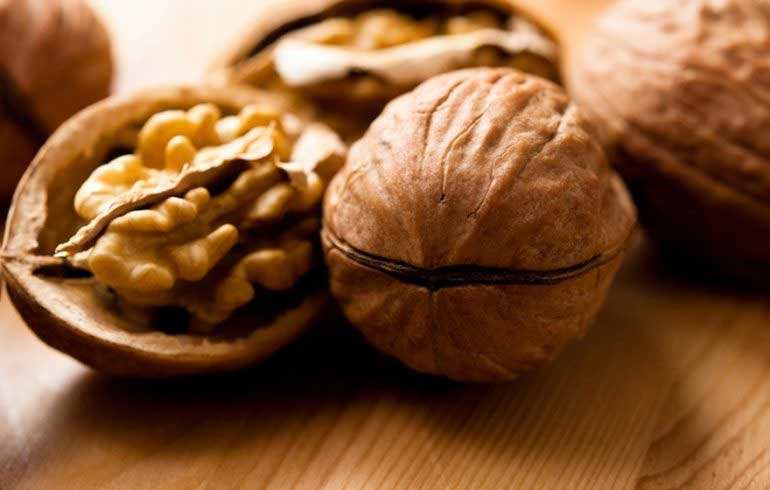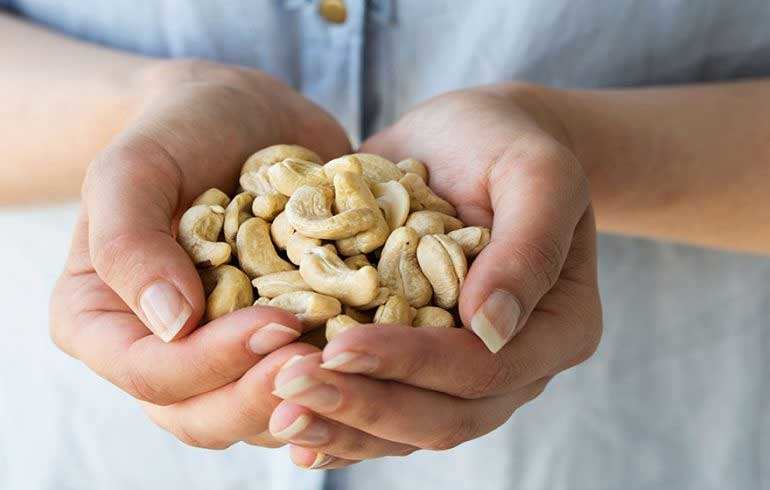
It’s true that nuts are higher in calories than some other foods. A handful of almonds, for example, has three times as many calories as a handful of mini pretzels. But these are hardly empty calories. Certified Nutritionist Monica Reinagel writes, “people who regularly enjoy nuts tend to live longer and have lower rates of heart disease, diabetes and certain types of cancer.”
Not surprisingly, both the U.S. Food and Drug Administration and the American Heart Association recommend eating a handful of nuts every day. The key is to keep an eye on your portion size. One serving is only about 1/4 to 1/3 cup. While that may not sound like a lot, nuts fill you up and may lead you to take in fewer calories in the long term.
6 Healthy Nuts to Add To Your Diet
1. Walnuts contain a plant-based omega-3 fatty acid.
Walnuts have particular superpowers. They contain large amounts (2.5 grams per 1 oz. serving) of alpha-linolenic acid (ALA), a plant-based omega-3 fatty acid that’s required by the human body. In fact, walnuts are the only nut to contain a significant amount of ALA. Also, a study published in the Journal of Nutrition indicated that consuming a 1/4 cup of walnuts per week could help reduce the risk of developing impairments in physical function.

2. Almonds contain heart-healthy fat.
One ounce of raw almonds (about 23 nuts) contains about 120 calories and 14 grams of fat, of which 8.7 are monounsaturated, the same kind of heart-healthy fat that’s found in avocados and olive oil. Eaten in moderation, monounsaturated fats can have a positive impact on your health. Monounsaturated fat is a key feature of the Mediterranean Diet, a healthy eating plan that’s linked to increased longevity and reduced chronic pain.
Monounsaturated fat also helps lower inflammation and bad low-density lipoprotein (LDL) cholesterol while simultaneously increasing healthy high-density lipoprotein (HDL) cholesterol, lowering heart disease risk. Adding almonds into your diet (unsalted are best) can lower your risk for heart disease and improve cholesterol levels, making them a great snack for older adults.

3. Pine nuts reduce the risk of heart disease.
Considering their nourishing array of vitamins, minerals and antioxidants, pine nuts offer a wide variety of health benefits to older adults. Like other nuts, pine nuts are high in beneficial monounsaturated fats, magnesium and vitamin E, which work together to protect the heart. Pine nuts also naturally contain plant sterols, a compound that can help lower low-density lipoprotein (LDL) cholesterol levels. Eating tree nuts, including pine nuts, is associated with lower waist circumference, body mass index and blood pressure.

4. Cashews promote eye health.
Move over carrots. One cup of these U-shaped nuts pack 8 micrograms of lutein and zeaxanthin, two powerful antioxidants that when eaten regularly protect eyes from light damage. They may also play a role in preventing age-related macular degeneration.

5. Macadamia nuts support regularity.
Macadamia nuts are worth their weight in nutritional gold. Full of fiber and healthy fats, adding macadamias to your diet is a healthy choice as you age. Just a dozen macadamia nuts can provide up to 10% of recommended daily fiber, so a handful goes a long way in helping digestion and bowel function. Nibbling just 1/2 a cup of macadamia nuts a day can also lower bad cholesterol, and with it, the risk of metabolic illnesses, including diabetes, high blood pressure and related cardiovascular diseases, and inflammation.
Macadamia nuts are also high in thiamin, which is critical for a healthy nervous system, and are chock full of manganese, a mineral essential for building and maintaining healthy bones.

6. Pistachios boost performance in the bedroom.
Packed with nutrients, these little green nuts promote heart health and bone density. As it turns out, eating as little as 100 grams of pistachios a day — about a handful — can actually help in the bedroom too. A Turkish study found that men experiencing erectile dysfunction saw significant improvement when they ate pistachios every day for three weeks. So be sure to keep a bowl on the nightstand.
And while the list of nutrients in pistachios is long, calcium and vitamin K, both critical for maintaining healthy bone density, really stand out. Just one cup of pistachios provides 132 milligrams of calcium and 16.2 micrograms of vitamin K. That works out to more than 10% of the recommended daily intake of each for older adults.

Important Notice: This article was originally published at www.lifetimedaily.com where all credits are due.
Disclaimer
The watching, interacting, and participation of any kind with anything on this page does not constitute or initiate a doctor-patient relationship with Dr. Farrah®. None of the statements here have been evaluated by the Food and Drug Administration (FDA). The products of Dr. Farrah® are not intended to diagnose, treat, cure, or prevent any disease. The information being provided should only be considered for education and entertainment purposes only. If you feel that anything you see or hear may be of value to you on this page or on any other medium of any kind associated with, showing, or quoting anything relating to Dr. Farrah® in any way at any time, you are encouraged to and agree to consult with a licensed healthcare professional in your area to discuss it. If you feel that you’re having a healthcare emergency, seek medical attention immediately. The views expressed here are simply either the views and opinions of Dr. Farrah® or others appearing and are protected under the first amendment.
Dr. Farrah® is a highly experienced Licensed Medical Doctor certified in evidence-based clinical nutrition, not some enthusiast, formulator, or medium promoting the wild and unrestrained use of nutrition products for health issues without clinical experience and scientific evidence of therapeutic benefit. Dr. Farrah® has personally and keenly studied everything she recommends, and more importantly, she’s closely observed the reactions and results in a clinical setting countless times over the course of her career involving the treatment of over 150,000 patients.
Dr. Farrah® promotes evidence-based natural approaches to health, which means integrating her individual scientific and clinical expertise with the best available external clinical evidence from systematic research. By individual clinical expertise, I refer to the proficiency and judgment that individual clinicians acquire through clinical experience and clinical practice.
Dr. Farrah® does not make any representation or warranties with respect to the accuracy, applicability, fitness, or completeness of any multimedia content provided. Dr. Farrah® does not warrant the performance, effectiveness, or applicability of any sites listed, linked, or referenced to, in, or by any multimedia content.
To be clear, the multimedia content is not intended to be a substitute for professional medical advice, diagnosis, or treatment. Always seek the advice of your physician or other qualified health providers with any questions you may have regarding a medical condition. Never disregard professional medical advice or delay in seeking it because of something you have read or seen in any website, video, image, or media of any kind. Dr. Farrah® hereby disclaims any and all liability to any party for any direct, indirect, implied, punitive, special, incidental, or other consequential damages arising directly or indirectly from any use of the content, which is provided as is, and without warranties.








